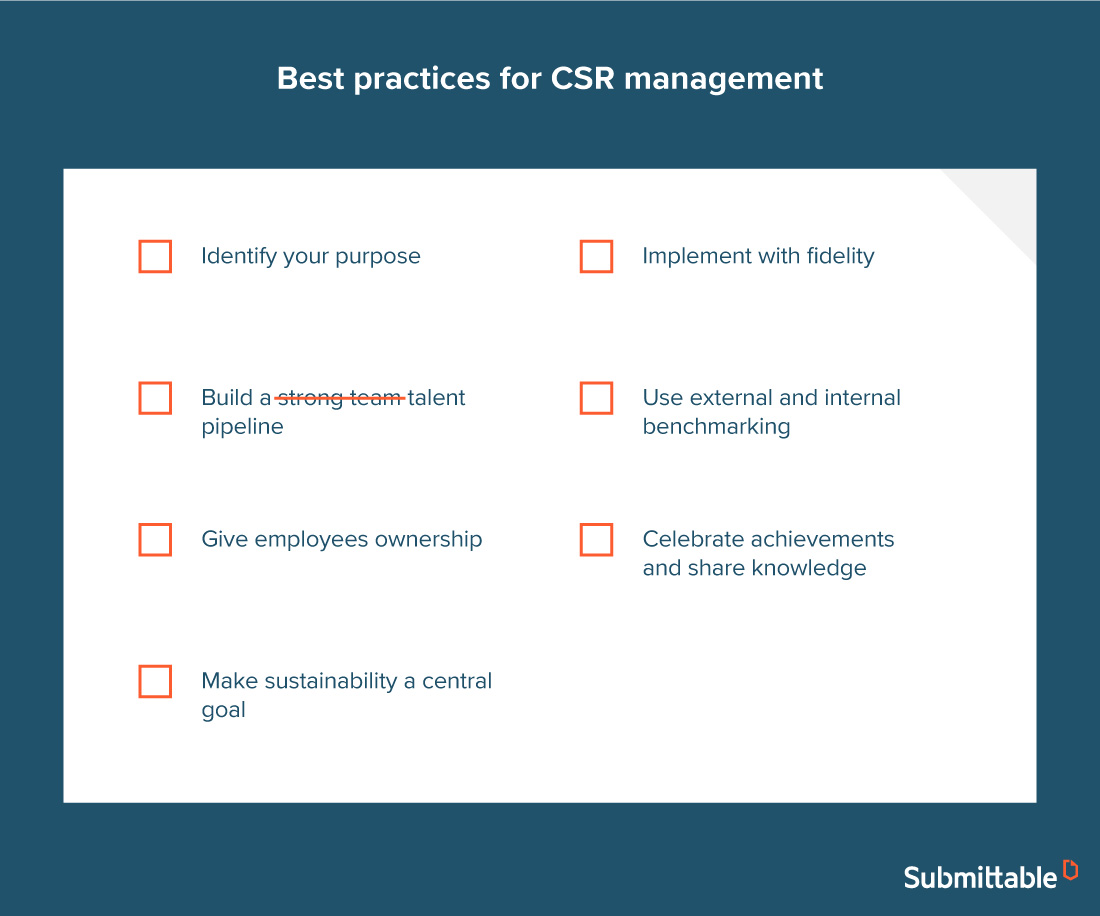The jury is in when it comes to CSR.
76% percent of Millennials already believe that business organizations can be a force for good.
The question of whether organizations can leverage CSR programs to make an impact in communities has been answered affirmatively. Yes, they can.
As CSR has moved into the C-suite, the focus has shifted to precisely how these organizations can best manage their corporate social responsibility programs.
Improving CSR management—with sustainability as a key pillar—has become the cause du jour among organizations looking to drive employee engagement, build brand equity, and most importantly, achieve lasting change in local communities.
Modern managers of CSR are on the lookout for strategic practices and promising new tools that will help their CSR initiatives achieve these lofty organizational goals. Let’s look at how CSR best practices are evolving in 2020.
Strategies for modern organizations to improve CSR management

1. Identify the purpose
The organizations doing top-notch CSR keep everything aligned.
Their CSR work links to an overall business strategy and is focused on ways to maximize value for the organization and the community.
These organizations have evaluated their core values, surveyed their employees, and conducted needs assessments with external partners to understand what the true purpose of their CSR initiatives should be.
That due diligence on the front-end pays major dividends on the back-end.
Consumers and employees alike can feel when an organization’s CSR efforts aren’t aligned to its overall mission, vision, and values. But when organizations get it right, the impact is noted across the board.
That’s the reality your organization should strive for when scoping out its CSR agenda.
2. Build a strong team talent pipeline
Yes, you need to build a network of internal allies to run your CSR program.
That’s a given.
But why not think of your CSR work as a broader capacity building initiative? Why not link your social impact work with your organization’s constant search for top talent? That exceptional volunteer or talented team member may demonstrate skills through CSR work that could make them a good fit for other important work within your organization.
It’s important to put together a cadre of employees who will represent your company well. They should be cross-functional and interdepartmental. For God’s sake make sure the team is diverse and representative of the company, as well as the communities with whom you’re working.
This crew should build upon the agenda-setting you’ve done around your core values and the overall purpose of your CSR work. They should hone your broad CSR goals into a draft plan for tackling specific challenges and addressing key opportunities, all while setting clear and concrete goals to be measured along the way.
Don’t forget about suppliers and vendors. They’re your partners in delivering goods and services to customers and there’s no reason they can’t be incentivized to help drive your CSR efforts forward.
3. Give employees ownership
Building a CSR team and talent pipeline is half the battle. Giving them the tools they need to succeed is equally important.
Remember that some of your most effective strategies for executing CSR will often come from your employees. Just look at how Johnson & Johnson leveraged employee insights to tackle its citizenship and sustainability goals.
When you make it clear that ideas from team members will not only be supported but integrated into CSR projects, the likelihood of them successfully completing that work increases significantly. Such work is also a fantastic employee development opportunity for team members at all levels.
Don’t make the classic mistake of asking employees to execute CSR priorities that have come down from “on high.” Give your team the agency to dream up and execute CSR projects that matter to them and flow naturally from organizational priorities.
It’ll make a big difference.
4. Make sustainability a central goal
The days of the one-off park cleanup in company t-shirts are over.
Sustainability can no longer be a standalone CSR objective. It must be part of a consistent approach to CSR that centers sustainable development as an organization-wide priority.
With 93% of CEOs insisting that sustainability is a key to success and 70% of CEOs sharing that CSR is essential to the profitability of companies, the inextricable link between CSR and sustainability is quite clear.
Sustainability should be the filter through which all of your broader corporate initiatives pass. Not only do environmental realities demand it (See: Australia is on fire), but consumers and employees can see right through organizations that “greenwash” their work.
We know consumers (especially Gen Z and Millennials) are looking to get their goods and services from organizations that make sustainability a core part of their values and practices. When it comes to modern CSR work infused with a focus on sustainability, they’re looking for organizations that:
- Set measurable goals
- Engage local stakeholders in CSR work
- Map out sustainability opportunities across the organization
- Build sustainable systems internally
- Assess the lifecycle of their goods and services
- Report regularly on sustainability and CSR initiatives
- Embrace sustainability branding
Taking these steps within the context of CSR work allows companies to facilitate meaningful projects that more deeply engage consumers and employees while achieving a truly sustainable impact when it comes to the environment.
5. Implement with fidelity
The most rewarding part of CSR is arguably when the work begins on the ground.
Employees get so much satisfaction (morale skyrockets) from connecting with communities and putting core values into practice. At this juncture, those initial goals and organizational priorities are especially important.
Balance is essential: stay flexible enough to respond to changing realities in communities while sticking to what your organization and CSR team initially set out to accomplish. It can be tricky, but maintaining a long-term commitment to the work will help smooth out inevitable bumps in the road.
This approach will also help organizations enlist local community leaders—they will appreciate how your organization balances flexibility and fidelity in its approach. Don’t forget that measurement becomes even more crucial once the implementation of your CSR project has begun.
You’ll know whether you’re staying true to initial goals through constant review of your data. That’s how you’ll assess whether you’re achieving the impact you’ve set out to achieve.
6. Use external and internal benchmarking
No organization wants to lag behind when it comes to sustainability and social impact.
For this reason, developing benchmarks that help your organization measure the progress of CSR projects is critical.
Internal benchmarks help different divisions within an organization understand their progress towards specific goals, such as reducing emissions within the supply chain. Encourage the sharing of this internal data among various divisions within the organization to promote healthy competition (and dissemination of best practices) towards sustainability goals.
External benchmarks empower your organization to measure the progress of your CSR work against that of peer organizations. Have a clear-eyed view of how other organizations are performing their CSR work to help enrich your organization’s existing and future initiatives.
Sharing results from other organizations doing similar work is another way to motivate employees around CSR performance.. Also, be sure to look at how organizations are depicted in reputable CSR rankings like the Dow Jones Sustainability Index.
In this way, CSR performance should become a central metric for the overall effectiveness of your organization, right up there with profitability and market share.
7. Celebrate achievements and share the knowledge
Let’s go back to an elementary school math class for a moment: show your work.
That’s especially true when it comes to highly-effective CSR projects. Demonstrating how your organization builds sustainability principles into its CSR work helps peer organizations do similar good work. Contributing to the knowledge base of the entire CSR sector is a great way to expand the impact of your CSR initiatives beyond just the projects led by your organization.
And don’t be shy about the media attention your CSR efforts will generate. This will drive employee engagement, attract better candidates to your talent pool, and encourage deeper support from consumers and investors.
Sharing stories of powerful CSR work helps to foster more satisfied and productive employees, which creates a virtuous cycle that feeds back into your profitability and future community work as an organization.
That’s how you maximize your organizational impact across the board.
Organize your CSR management from one centralized platform
One thing is clear: Millennials are bullish on organizations and their CSR programs.
So how will your organization tap into that energy within the market to turn a profit and do some good in communities?
From building a strong CSR talent pipeline and establishing clear benchmarks to centering sustainability as a key goal and celebrating wins in the community, success comes down to efficient and professional CSR management.
CSR managers today can benefit from CSR software to help them organize key stakeholders, coordinate community initiatives, and measure the impact of social impact work.
Pulling together the many disparate parts that often make up complex CSR programs into one centralized system is essential—this allows CSR managers to execute most effectively on designated goals.
With the right best practices informing their strategies and smart technological tools in hand, CSR managers can maximize the impact of CSR initiatives with sustainability at the core.

